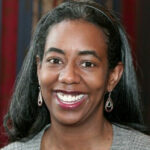Build self-awareness strategies to foster cultural inclusion in your departmental meetings.
We often hold implicit and explicit biases, prejudices, and beliefs about our own and others’ social identities. Whether communicated subtly or directly, these ideas can cause damage in group settings and interfere with the purpose and goals of departmental meetings. These barriers can harm vital components of effective teamwork, such as collaboration and team camaraderie, and further exclude group members from the conversation.
Join us for this online training and learn how to positively impact group dynamics by adopting reflective practices and establishing accountability partners. We’ll show you how to use critical communication skills, such as deep listening, genuine question probing, and suspending assumptions and judgments to effectively foster collaboration, team-building, and healthy team dynamics.
Who Should Attend
This webcast will help leaders of departmental meetings re-energize themselves and learn how to facilitate unbiased, culturally inclusive meetings to optimize group dynamics.
After a brief overview of the empirical research that demonstrates the propensity for departmental heads to bring bias to the meetings they facilitate, our instructor will dive deeper into how to:
- Establish tools to become an effective Reflective-Practitioner.
- Understand and practice critical communication skills (e.g., deep listening, genuine question probing, and suspending assumptions and judgments) to foster inclusion and collaboration in a group setting.
- Understand the value of establishing accountability partners.

Dr. Bridget Turner Kelly, Associate Professor, University of Maryland
Dr. Bridget Turner Kelly is currently an Associate Professor of Student Affairs at the University of Maryland. Prior to this role, she was the Associate Professor of Higher Education at Loyola University Chicago for nine years. Dr. Turner Kelly’s scholarship is focused on marginalized populations in higher education; more specifically, she studies the experiences of students of color on predominantly White campuses, women and faculty of color at research universities, and how all students can become socially just educators. She has authored over 25 publications, including articles in peer-refereed journals of high national reputation, two articles have received over 200 citations each and two have been cited in AMICUS briefs for U.S. Supreme Court cases.
Dr. Turner Kelly has also presented numerous refereed papers at national conferences. She won Distinguished Faculty Award for Excellence in teaching from the School of Education at Loyola University Chicago in 2014, was named a 2013 Diamond Honoree for College Student Educators International (ACPA), awarded the NASPA IV-East Outstanding Contribution to Student Affairs through Teaching in 2011, recognized as an Emerging Scholar by ACPA in 2005, and received the Peggy R. Williams Emerging Professional Award in 2004 from the Office on Women in Higher Education, a division of the American Council on Education. Beginning July 2017 for a three-year term, NASPA appointed Dr. Turner Kelly as Executive Editor of the Journal of Student Affairs Research and Practice (JSARP).
Questions About the Event?

Rabia Khan Harvey
Senior Program Manager, Academic Impressions

